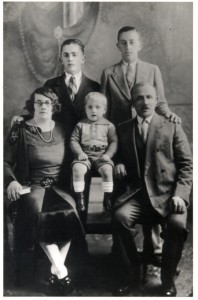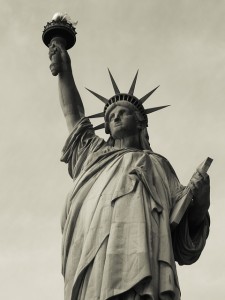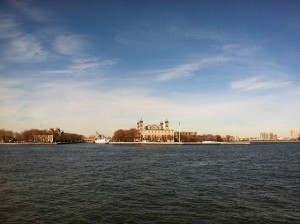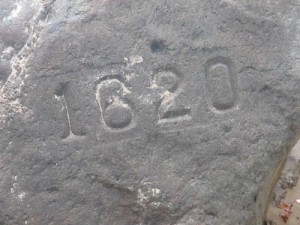I wrote My Plymouth Rock for Thanksgiving, 2007. I’m republishing it now, when many Americans seem to have forgotten how most of our families arrived here.

I first learned about the Pilgrims in 1963, when I was in second grade and Columbus’s discovery of America was still considered an unqualified success that logically led to eating turkey on the fourth Thursday in November. It would be years before I learned that the natives provided the first Thanksgiving dinner, and a few years more before I realized that my grandparents hadn’t been there.
Gradually, I became vaguely aware that my grandparents came to America on a boat that wasn’t the Mayflower and that they hadn’t come from England, but from a country that no longer existed. I was not sure how countries could disappear. As a seven year old, I still believed maps were drawn with permanent ink.
I knew that my grandparents and the Pilgrims were all old, but that three hundred years separated them was beyond my elementary reasoning.

My grandparents and the Pilgrims were all immigrants. That John Winthrop left behind landed wealth and my grandparents hand-carried their two silver candlesticks didn’t diminish the fact that they all abandoned their birth lands for America.
Like the Pilgrims, my grandparents sought religious freedom. That Puritanism and Judaism are different religions didn’t concern my second-grade mind. My focus was on the basics – like Palmer script.
We ate turkey and cranberry sauce and thought about the long-suffering Pilgrims in their tall hats and buckled boots (as we had been taught in school), but we were really celebrating the endurance of all Pilgrims, including my grandparents. My grandparents had ripped themselves up from European soil just before they would have been weeded out. They transplanted themselves like seedlings in clay pots, to small, Brooklyn apartments, with narrow windowsills, and they raised their children on pavement.

My grandparents survived the transatlantic passage and crossed the threshold of America at the immigration station on Ellis Island. They climbed the stairs into the Great Hall, where they stood for inspection by the six-second doctors in the glow of electric lights, which they had probably never seen before. Under the great, vaulted ceiling, they each waited in the hot press of travel-worn pilgrims—all hopeful, all stinking of excitement and fear.
My grandfather Jacob arrived in 1914. He sent the money he earned as a shoemaker to my grandmother and uncles, who joined him in 1921.
Both my parents were born in this country. They are Americans, but I think of them as pilgrims too, like all the rest. Their pilgrimages took them to ivy-covered halls and on to pioneering professional careers and a house in the suburbs, where they cultivated my three brothers and me.
The four of us have scattered across the continent, on pilgrimages of our own. And it’s this tradition of seeking freedom and meaning that we celebrate on this uniquely American holiday.

At Thanksgiving in my house, we eat turkey and salute my grandparents who stepped ashore on Ellis Island, my family’s Plymouth Rock.
This essay was broadcast on the stations of Vermont Public Radio on 11/22/2007. Listen here. To receive new posts by email every Wednesday, enter your address in the box on the right, click “subscribe” and then check your email to confirm your subscription. Thanks.
Great post and a good reminder for everyone.
Thanks, Andrew, for your comment here and for all your “likes.” I’m grateful for your constant readership and look forward to seeing your face every week. Blessings to you and yours this Thanksgiving.
I look forward to reading each Wednesday’s posting from you. I come away thinking about and visualizing what you share. I enjoy hearing your voice. Thanks.
Thanks so much for your kind comment. I’m grateful for readers like you!
Beautiful.
Thank you!